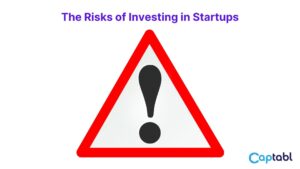Introduction:
Investing in startups has emerged as an exciting and potentially lucrative avenue for investors looking for high-growth opportunities.
In this article, we will explore the benefits and risks of investing in startups, providing you with valuable insights to consider before diving into this exciting world of entrepreneurship and innovation.
Part I: The Benefits of Investing in Startups


Potential for High Returns:
One of the primary attractions of investing in startups is the potential for high returns on investment. While not all startups succeed, the ones that do can experience exponential growth, leading to significant financial rewards. By investing in startups at an early stage, you have the opportunity to participate in their journey of growth and success, which can result in outsized returns compared to traditional investment avenues.
Access to Innovation and Disruption:
Startups are known for their innovative ideas, disruptive technologies, and novel business models. By investing in startups, you gain exposure to these cutting-edge innovations that have the potential to transform industries and create new market opportunities. Supporting startups allows you to be at the forefront of technological advancements and contribute to shaping the future.
Diversification of Investment Portfolio:
Investing in startups offers diversification benefits for your investment portfolio. Startups have different risk-return profiles compared to traditional asset classes like stocks or bonds. By allocating a portion of your portfolio to startups, you reduce the reliance on traditional investments and gain exposure to potentially high-growth sectors. Diversification can help mitigate risks and enhance overall portfolio performance.
Active Involvement and Impact:
Investing in startups often goes beyond providing capital. Many startups welcome active involvement from investors who can contribute their expertise, industry knowledge, and networks. By actively engaging with the startup’s management team, you can provide guidance, mentorship, and strategic insights, thereby actively shaping the startup’s growth trajectory. This level of involvement can be highly rewarding and allows you to make a tangible impact on the startup’s success.
Part II: The Risks of Investing in Startups


High Failure Rate:
It’s crucial to acknowledge that investing in startups carries a high risk of failure. Startups operate in a volatile and competitive environment, and many fail to achieve profitability or sustainable growth. As an investor, you must be prepared for the possibility of losing your entire investment. Thorough due diligence and careful evaluation of startups can help mitigate this risk, but it’s essential to understand that startup investing is inherently risky.
Lack of Liquidity:
Investing in startups often requires a long-term commitment. Unlike publicly traded stocks, startups typically have limited liquidity options. It may take several years for a startup to reach a liquidity event such as an acquisition or an initial public offering (IPO). This lack of liquidity means that your invested capital may be tied up for an extended period, potentially impacting your financial flexibility and investment strategy.
Valuation Challenges:
Determining the valuation of startups, especially in the early stages, can be challenging. Startups often lack a proven track record, making it difficult to assess their worth. Valuations are typically based on assumptions, projections, and market trends. As an investor, it’s crucial to conduct thorough due diligence, evaluate the startup’s financial projections, and seek professional advice to ensure that the valuation aligns with the startup’s growth potential.
Market and Execution Risks:
Startups operate in dynamic markets and face numerous uncertainties. Changes in consumer preferences, market trends, or regulatory landscapes can significantly impact a startup’s growth prospects. Additionally, startups may face execution risks, such as challenges in scaling operations, attracting customers, or building sustainable revenue.
Team and Leadership Risks:
The success of a startup heavily depends on the capabilities and expertise of its founding team and key leaders. Investing in startups means placing trust in the management team’s ability to execute the business plan, make critical decisions, and navigate challenges effectively. However, there is always a risk of inexperienced or ineffective leadership, which can significantly impact the startup’s performance and overall success. Conducting thorough due diligence on the team’s background, track record, and expertise is crucial to assess their ability to drive the startup towards its goals.
Regulatory and Legal Challenges:
Startups often operate in industries that are subject to complex regulations and legal frameworks. Compliance with changing regulations can be a significant challenge for startups, especially if they lack the resources or expertise to navigate these landscapes. As an investor, it’s important to assess the startup’s understanding of regulatory requirements, their ability to adapt to changes, and any potential legal risks that may arise. Engaging legal professionals with expertise in startup investing can provide valuable insights and mitigate legal and regulatory risks.
Conclusion:
Investing in startups offers both exciting opportunities and inherent risks. Understanding the benefits and risks associated with startup investing is crucial for making informed investment decisions. While the potential for high returns, access to innovation, and portfolio diversification make startups an attractive investment option, it’s important to be aware of the high failure rate, lack of liquidity, valuation challenges, market and execution risks, team and leadership risks, as well as regulatory and legal challenges.
Mitigating these risks requires thorough due diligence, evaluating startups based on their market potential, business model viability, management team capabilities, and understanding the regulatory landscape. Diversifying your startup portfolio, seeking professional advice, and actively engaging with startups can also contribute to reducing risks and increasing the chances of investment success.
Ultimately, investing in startups requires a long-term perspective, patience, and the ability to tolerate higher risk. By carefully assessing opportunities and understanding the dynamics of the startup ecosystem, investors can position themselves to benefit from the potential rewards that startups can offer in terms of financial returns, innovation, and societal impact.

Yes I am agree with that
Pingback: How Much Should I Invest in Startups - Captabl.in
Pingback: How Can I Identify Red Flags When Evaluating Startup Investments? - Captabl.in
Pingback: Investing in Startups: Local vs. Global Opportunities - Captabl.in
Pingback: Investor Rights and Protections - Captabl.in